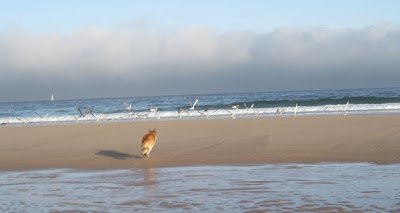
Yesterday afternoon I was having a lemonade at a café in Sintra in a square filled with bougainvillea and wisteria.


Sintra is an enchanting UNESCO World Heritage Site about 15 kilometers away. Leafing through a free newspaper from the table next to me, I came upon an unusual article which I loosely translate here:


‘’July 29, 2009. At the Hotel Central in Sintra, Anna Thulin, a Swedish woman well known in Sintra, was taken by ambulance to the Sintra-Amadora Hospital on Tuesday evening, July 27. The manager of the Hotel Central was alerted by one of the hotel’s cleaning staff who had gone to turn down the sheets in the early evening and found Mrs. Thulin unconscious on a bed. Two empty bottles of sleeping pills were found on the table next to the bed. The hotel staff was unable to provide further information about Ms. Thulin’s stay at the hotel, or any explanation for what appeared to be an attempted suicide.
“The Sintra-Amadora Hospital reported that the patient’s condition was stable, that she is now out of the Intensive Care Unit, resting in a private room and receiving no visitors.
“A member of the Sintra police who did not reveal his name since he is not authorized to speak with the press disclosed that the Mrs. Thulin, 39, a former Swedish beauty queen, has been a resident of Sintra for twenty years, and runs a travel agency in the center of town. The police have no idea why she was renting a room at the Hotel Central, when she resides at a manor house with a large garden next door to her travel agency, just a few hundred meters from the hotel. Her expensive imported car is also missing. The officer stated that the police found an extensive note in Mrs. Thulin’s room, which he said could become the subject of further investigation.
“Miss Clara Pereira, an employee at Mrs. Thulin’s travel agency, said that Anna Thulin was admired in the community and ran a profitable excursions business. However, recently Mrs. Thulin was rarely in the office, and she had to do almost all the work of the agency. Miss Pereira said that Mrs. Thulin always attracted a great deal of attention – and even jealousy -- in Sintra. Miss Pereira added that her boss is married to Mr. Vasco de Sousa, a young, notorious, sports lawyer, and that the couple has no children.
“Mr. Vasco de Sousa did not respond to our repeated requests for comment.
“Mrs. Anna Thulin is apparently out of medical danger, but there remain many questions to be answered about this case."

“The Sintra-Amadora Hospital reported that the patient’s condition was stable, that she is now out of the Intensive Care Unit, resting in a private room and receiving no visitors.
“A member of the Sintra police who did not reveal his name since he is not authorized to speak with the press disclosed that the Mrs. Thulin, 39, a former Swedish beauty queen, has been a resident of Sintra for twenty years, and runs a travel agency in the center of town. The police have no idea why she was renting a room at the Hotel Central, when she resides at a manor house with a large garden next door to her travel agency, just a few hundred meters from the hotel. Her expensive imported car is also missing. The officer stated that the police found an extensive note in Mrs. Thulin’s room, which he said could become the subject of further investigation.
“Miss Clara Pereira, an employee at Mrs. Thulin’s travel agency, said that Anna Thulin was admired in the community and ran a profitable excursions business. However, recently Mrs. Thulin was rarely in the office, and she had to do almost all the work of the agency. Miss Pereira said that Mrs. Thulin always attracted a great deal of attention – and even jealousy -- in Sintra. Miss Pereira added that her boss is married to Mr. Vasco de Sousa, a young, notorious, sports lawyer, and that the couple has no children.
“Mr. Vasco de Sousa did not respond to our repeated requests for comment.
“Mrs. Anna Thulin is apparently out of medical danger, but there remain many questions to be answered about this case."

I closed the paper and thought about the darkest part of the dark in this luminescent square. What could cause a beautiful successful young woman to want to take her life in an emblematic hotel in Sintra? And justify it in an extensive note? Perhaps the real story will never see the light of day, but suicide can be a kind of revenge against those who stay behind.



























































